Management Roles, Theories, and Practices: Allstyles Case Study
VerifiedAdded on 2023/01/09
|12
|3692
|84
Report
AI Summary
This report provides a comprehensive analysis of management practices at Allstyles departmental stores, focusing on the roles and functions performed by General Manager Rebecca. The report examines key management responsibilities, including communication and coordination, setting objectives, motivating employees, performance management, planning and scheduling, and conflict resolution. Through the analysis of case study clips, the report highlights how Rebecca effectively implements these roles to ensure the store's operational success. Furthermore, the report explores the application of two prominent management theories: Scientific Management Theory and Human Relations Theory, in the context of the Allstyles case study. The report demonstrates how these theories are relevant to understanding the management strategies employed by Rebecca and their impact on the store's performance and employee relations.
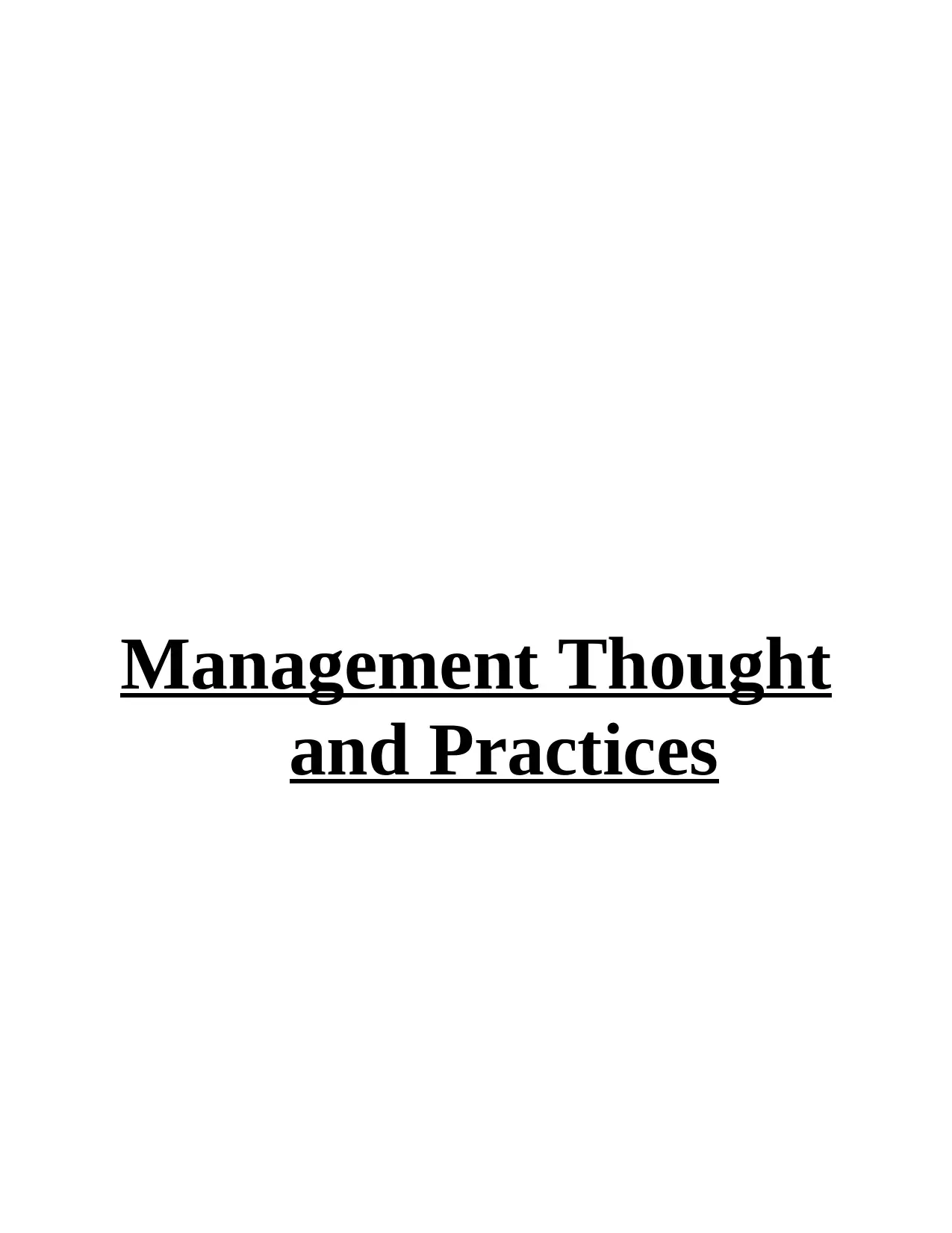
Management Thought
and Practices
and Practices
Paraphrase This Document
Need a fresh take? Get an instant paraphrase of this document with our AI Paraphraser
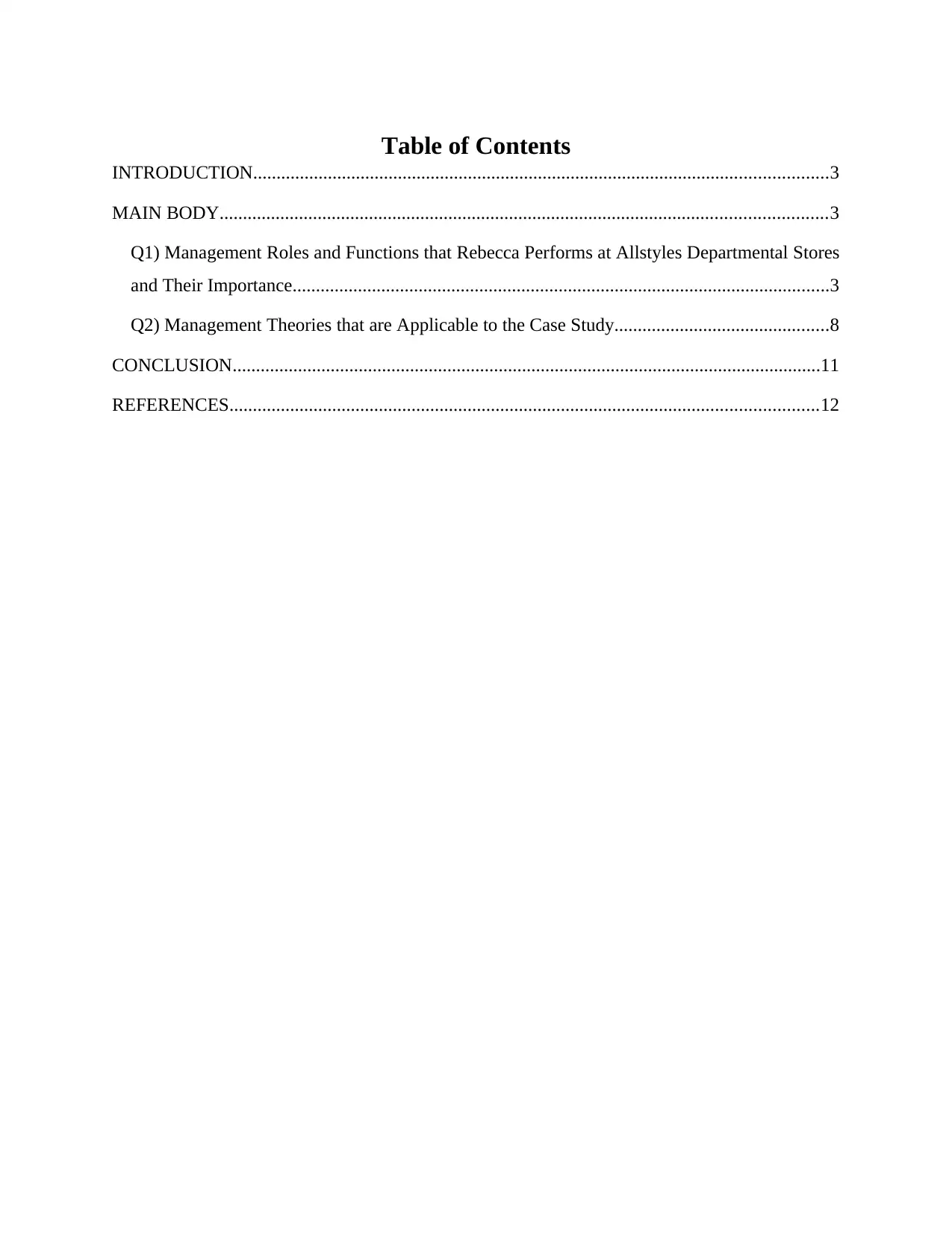
Table of Contents
INTRODUCTION...........................................................................................................................3
MAIN BODY..................................................................................................................................3
Q1) Management Roles and Functions that Rebecca Performs at Allstyles Departmental Stores
and Their Importance...................................................................................................................3
Q2) Management Theories that are Applicable to the Case Study..............................................8
CONCLUSION..............................................................................................................................11
REFERENCES..............................................................................................................................12
INTRODUCTION...........................................................................................................................3
MAIN BODY..................................................................................................................................3
Q1) Management Roles and Functions that Rebecca Performs at Allstyles Departmental Stores
and Their Importance...................................................................................................................3
Q2) Management Theories that are Applicable to the Case Study..............................................8
CONCLUSION..............................................................................................................................11
REFERENCES..............................................................................................................................12
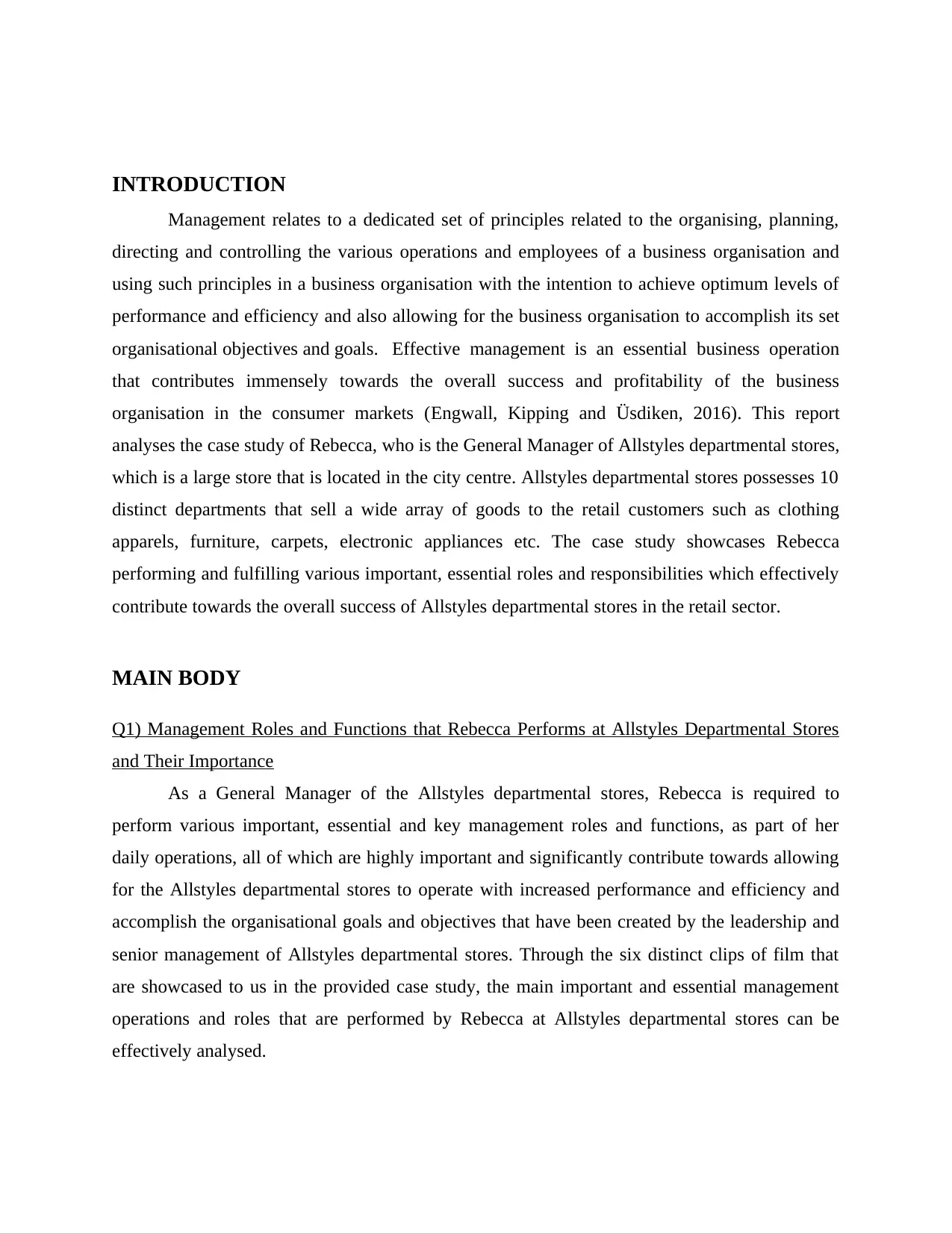
INTRODUCTION
Management relates to a dedicated set of principles related to the organising, planning,
directing and controlling the various operations and employees of a business organisation and
using such principles in a business organisation with the intention to achieve optimum levels of
performance and efficiency and also allowing for the business organisation to accomplish its set
organisational objectives and goals. Effective management is an essential business operation
that contributes immensely towards the overall success and profitability of the business
organisation in the consumer markets (Engwall, Kipping and Üsdiken, 2016). This report
analyses the case study of Rebecca, who is the General Manager of Allstyles departmental stores,
which is a large store that is located in the city centre. Allstyles departmental stores possesses 10
distinct departments that sell a wide array of goods to the retail customers such as clothing
apparels, furniture, carpets, electronic appliances etc. The case study showcases Rebecca
performing and fulfilling various important, essential roles and responsibilities which effectively
contribute towards the overall success of Allstyles departmental stores in the retail sector.
MAIN BODY
Q1) Management Roles and Functions that Rebecca Performs at Allstyles Departmental Stores
and Their Importance
As a General Manager of the Allstyles departmental stores, Rebecca is required to
perform various important, essential and key management roles and functions, as part of her
daily operations, all of which are highly important and significantly contribute towards allowing
for the Allstyles departmental stores to operate with increased performance and efficiency and
accomplish the organisational goals and objectives that have been created by the leadership and
senior management of Allstyles departmental stores. Through the six distinct clips of film that
are showcased to us in the provided case study, the main important and essential management
operations and roles that are performed by Rebecca at Allstyles departmental stores can be
effectively analysed.
Management relates to a dedicated set of principles related to the organising, planning,
directing and controlling the various operations and employees of a business organisation and
using such principles in a business organisation with the intention to achieve optimum levels of
performance and efficiency and also allowing for the business organisation to accomplish its set
organisational objectives and goals. Effective management is an essential business operation
that contributes immensely towards the overall success and profitability of the business
organisation in the consumer markets (Engwall, Kipping and Üsdiken, 2016). This report
analyses the case study of Rebecca, who is the General Manager of Allstyles departmental stores,
which is a large store that is located in the city centre. Allstyles departmental stores possesses 10
distinct departments that sell a wide array of goods to the retail customers such as clothing
apparels, furniture, carpets, electronic appliances etc. The case study showcases Rebecca
performing and fulfilling various important, essential roles and responsibilities which effectively
contribute towards the overall success of Allstyles departmental stores in the retail sector.
MAIN BODY
Q1) Management Roles and Functions that Rebecca Performs at Allstyles Departmental Stores
and Their Importance
As a General Manager of the Allstyles departmental stores, Rebecca is required to
perform various important, essential and key management roles and functions, as part of her
daily operations, all of which are highly important and significantly contribute towards allowing
for the Allstyles departmental stores to operate with increased performance and efficiency and
accomplish the organisational goals and objectives that have been created by the leadership and
senior management of Allstyles departmental stores. Through the six distinct clips of film that
are showcased to us in the provided case study, the main important and essential management
operations and roles that are performed by Rebecca at Allstyles departmental stores can be
effectively analysed.
⊘ This is a preview!⊘
Do you want full access?
Subscribe today to unlock all pages.

Trusted by 1+ million students worldwide
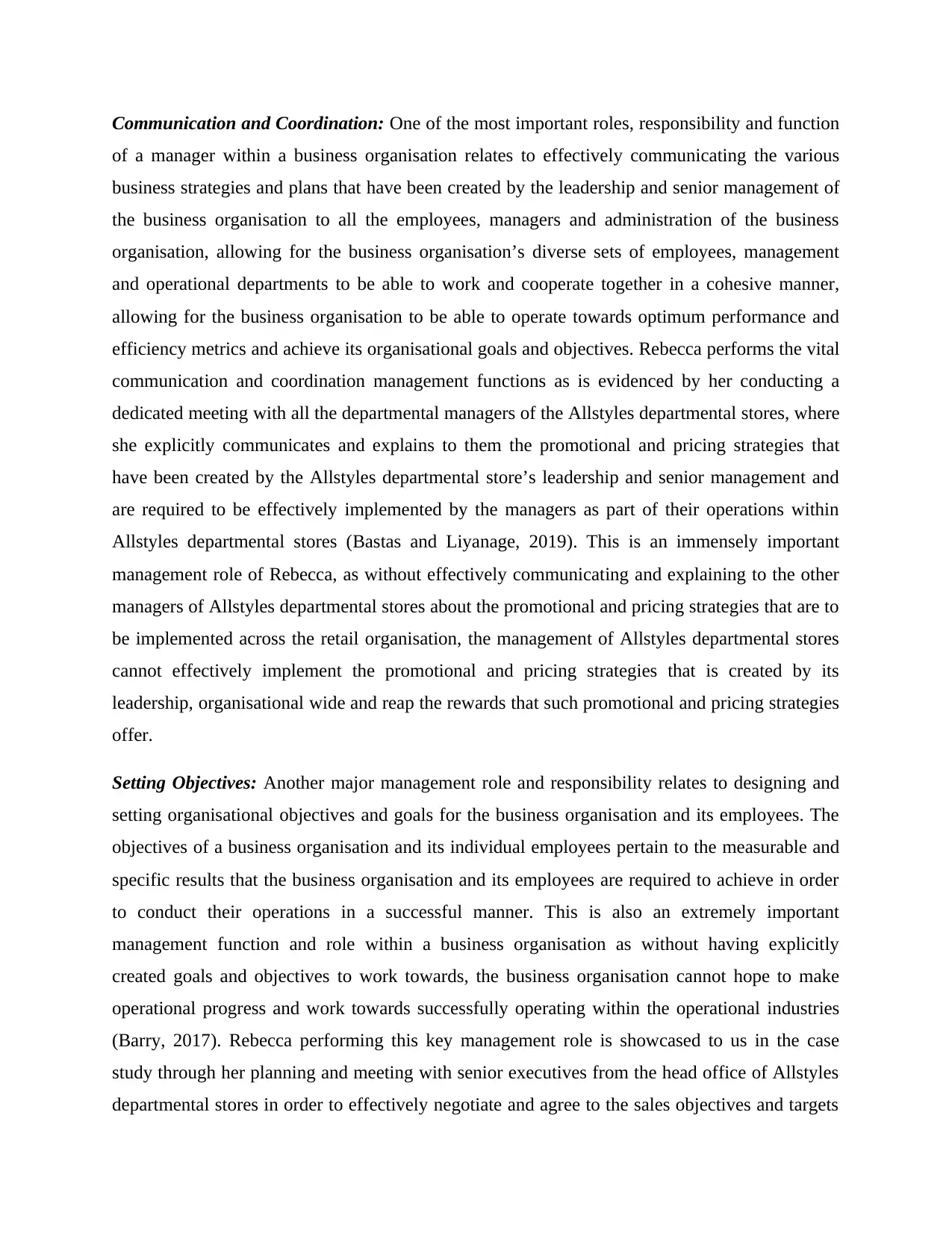
Communication and Coordination: One of the most important roles, responsibility and function
of a manager within a business organisation relates to effectively communicating the various
business strategies and plans that have been created by the leadership and senior management of
the business organisation to all the employees, managers and administration of the business
organisation, allowing for the business organisation’s diverse sets of employees, management
and operational departments to be able to work and cooperate together in a cohesive manner,
allowing for the business organisation to be able to operate towards optimum performance and
efficiency metrics and achieve its organisational goals and objectives. Rebecca performs the vital
communication and coordination management functions as is evidenced by her conducting a
dedicated meeting with all the departmental managers of the Allstyles departmental stores, where
she explicitly communicates and explains to them the promotional and pricing strategies that
have been created by the Allstyles departmental store’s leadership and senior management and
are required to be effectively implemented by the managers as part of their operations within
Allstyles departmental stores (Bastas and Liyanage, 2019). This is an immensely important
management role of Rebecca, as without effectively communicating and explaining to the other
managers of Allstyles departmental stores about the promotional and pricing strategies that are to
be implemented across the retail organisation, the management of Allstyles departmental stores
cannot effectively implement the promotional and pricing strategies that is created by its
leadership, organisational wide and reap the rewards that such promotional and pricing strategies
offer.
Setting Objectives: Another major management role and responsibility relates to designing and
setting organisational objectives and goals for the business organisation and its employees. The
objectives of a business organisation and its individual employees pertain to the measurable and
specific results that the business organisation and its employees are required to achieve in order
to conduct their operations in a successful manner. This is also an extremely important
management function and role within a business organisation as without having explicitly
created goals and objectives to work towards, the business organisation cannot hope to make
operational progress and work towards successfully operating within the operational industries
(Barry, 2017). Rebecca performing this key management role is showcased to us in the case
study through her planning and meeting with senior executives from the head office of Allstyles
departmental stores in order to effectively negotiate and agree to the sales objectives and targets
of a manager within a business organisation relates to effectively communicating the various
business strategies and plans that have been created by the leadership and senior management of
the business organisation to all the employees, managers and administration of the business
organisation, allowing for the business organisation’s diverse sets of employees, management
and operational departments to be able to work and cooperate together in a cohesive manner,
allowing for the business organisation to be able to operate towards optimum performance and
efficiency metrics and achieve its organisational goals and objectives. Rebecca performs the vital
communication and coordination management functions as is evidenced by her conducting a
dedicated meeting with all the departmental managers of the Allstyles departmental stores, where
she explicitly communicates and explains to them the promotional and pricing strategies that
have been created by the Allstyles departmental store’s leadership and senior management and
are required to be effectively implemented by the managers as part of their operations within
Allstyles departmental stores (Bastas and Liyanage, 2019). This is an immensely important
management role of Rebecca, as without effectively communicating and explaining to the other
managers of Allstyles departmental stores about the promotional and pricing strategies that are to
be implemented across the retail organisation, the management of Allstyles departmental stores
cannot effectively implement the promotional and pricing strategies that is created by its
leadership, organisational wide and reap the rewards that such promotional and pricing strategies
offer.
Setting Objectives: Another major management role and responsibility relates to designing and
setting organisational objectives and goals for the business organisation and its employees. The
objectives of a business organisation and its individual employees pertain to the measurable and
specific results that the business organisation and its employees are required to achieve in order
to conduct their operations in a successful manner. This is also an extremely important
management function and role within a business organisation as without having explicitly
created goals and objectives to work towards, the business organisation cannot hope to make
operational progress and work towards successfully operating within the operational industries
(Barry, 2017). Rebecca performing this key management role is showcased to us in the case
study through her planning and meeting with senior executives from the head office of Allstyles
departmental stores in order to effectively negotiate and agree to the sales objectives and targets
Paraphrase This Document
Need a fresh take? Get an instant paraphrase of this document with our AI Paraphraser
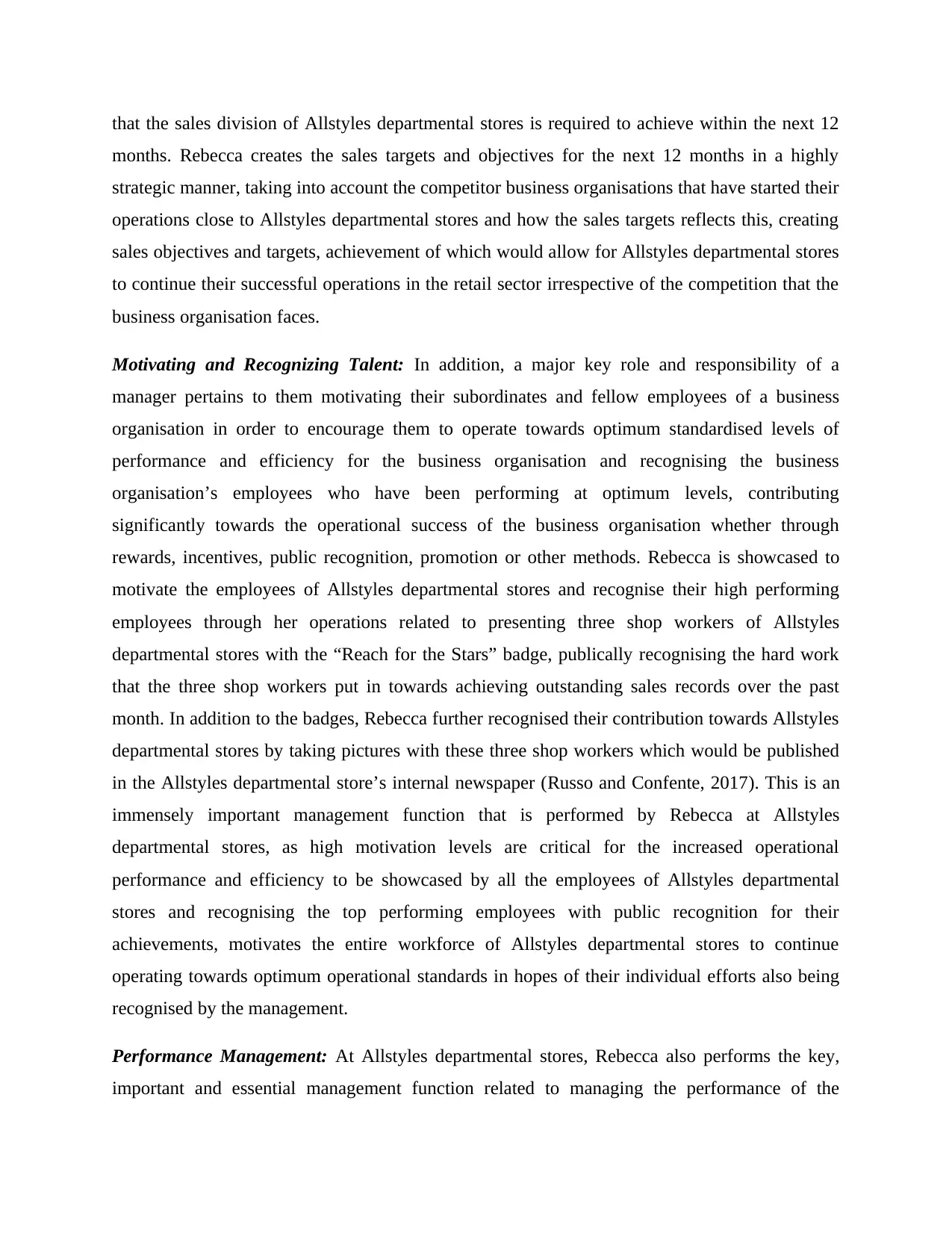
that the sales division of Allstyles departmental stores is required to achieve within the next 12
months. Rebecca creates the sales targets and objectives for the next 12 months in a highly
strategic manner, taking into account the competitor business organisations that have started their
operations close to Allstyles departmental stores and how the sales targets reflects this, creating
sales objectives and targets, achievement of which would allow for Allstyles departmental stores
to continue their successful operations in the retail sector irrespective of the competition that the
business organisation faces.
Motivating and Recognizing Talent: In addition, a major key role and responsibility of a
manager pertains to them motivating their subordinates and fellow employees of a business
organisation in order to encourage them to operate towards optimum standardised levels of
performance and efficiency for the business organisation and recognising the business
organisation’s employees who have been performing at optimum levels, contributing
significantly towards the operational success of the business organisation whether through
rewards, incentives, public recognition, promotion or other methods. Rebecca is showcased to
motivate the employees of Allstyles departmental stores and recognise their high performing
employees through her operations related to presenting three shop workers of Allstyles
departmental stores with the “Reach for the Stars” badge, publically recognising the hard work
that the three shop workers put in towards achieving outstanding sales records over the past
month. In addition to the badges, Rebecca further recognised their contribution towards Allstyles
departmental stores by taking pictures with these three shop workers which would be published
in the Allstyles departmental store’s internal newspaper (Russo and Confente, 2017). This is an
immensely important management function that is performed by Rebecca at Allstyles
departmental stores, as high motivation levels are critical for the increased operational
performance and efficiency to be showcased by all the employees of Allstyles departmental
stores and recognising the top performing employees with public recognition for their
achievements, motivates the entire workforce of Allstyles departmental stores to continue
operating towards optimum operational standards in hopes of their individual efforts also being
recognised by the management.
Performance Management: At Allstyles departmental stores, Rebecca also performs the key,
important and essential management function related to managing the performance of the
months. Rebecca creates the sales targets and objectives for the next 12 months in a highly
strategic manner, taking into account the competitor business organisations that have started their
operations close to Allstyles departmental stores and how the sales targets reflects this, creating
sales objectives and targets, achievement of which would allow for Allstyles departmental stores
to continue their successful operations in the retail sector irrespective of the competition that the
business organisation faces.
Motivating and Recognizing Talent: In addition, a major key role and responsibility of a
manager pertains to them motivating their subordinates and fellow employees of a business
organisation in order to encourage them to operate towards optimum standardised levels of
performance and efficiency for the business organisation and recognising the business
organisation’s employees who have been performing at optimum levels, contributing
significantly towards the operational success of the business organisation whether through
rewards, incentives, public recognition, promotion or other methods. Rebecca is showcased to
motivate the employees of Allstyles departmental stores and recognise their high performing
employees through her operations related to presenting three shop workers of Allstyles
departmental stores with the “Reach for the Stars” badge, publically recognising the hard work
that the three shop workers put in towards achieving outstanding sales records over the past
month. In addition to the badges, Rebecca further recognised their contribution towards Allstyles
departmental stores by taking pictures with these three shop workers which would be published
in the Allstyles departmental store’s internal newspaper (Russo and Confente, 2017). This is an
immensely important management function that is performed by Rebecca at Allstyles
departmental stores, as high motivation levels are critical for the increased operational
performance and efficiency to be showcased by all the employees of Allstyles departmental
stores and recognising the top performing employees with public recognition for their
achievements, motivates the entire workforce of Allstyles departmental stores to continue
operating towards optimum operational standards in hopes of their individual efforts also being
recognised by the management.
Performance Management: At Allstyles departmental stores, Rebecca also performs the key,
important and essential management function related to managing the performance of the
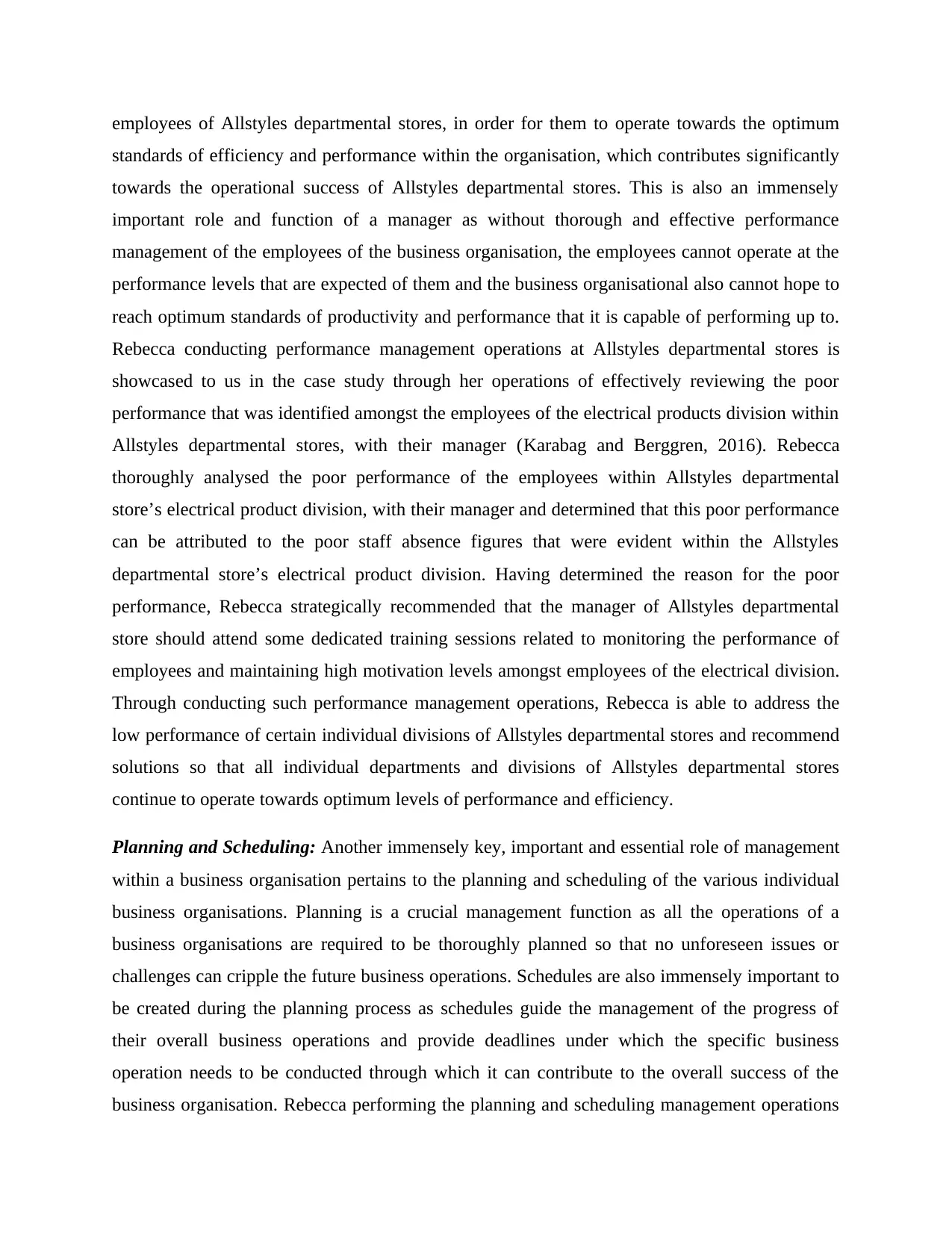
employees of Allstyles departmental stores, in order for them to operate towards the optimum
standards of efficiency and performance within the organisation, which contributes significantly
towards the operational success of Allstyles departmental stores. This is also an immensely
important role and function of a manager as without thorough and effective performance
management of the employees of the business organisation, the employees cannot operate at the
performance levels that are expected of them and the business organisational also cannot hope to
reach optimum standards of productivity and performance that it is capable of performing up to.
Rebecca conducting performance management operations at Allstyles departmental stores is
showcased to us in the case study through her operations of effectively reviewing the poor
performance that was identified amongst the employees of the electrical products division within
Allstyles departmental stores, with their manager (Karabag and Berggren, 2016). Rebecca
thoroughly analysed the poor performance of the employees within Allstyles departmental
store’s electrical product division, with their manager and determined that this poor performance
can be attributed to the poor staff absence figures that were evident within the Allstyles
departmental store’s electrical product division. Having determined the reason for the poor
performance, Rebecca strategically recommended that the manager of Allstyles departmental
store should attend some dedicated training sessions related to monitoring the performance of
employees and maintaining high motivation levels amongst employees of the electrical division.
Through conducting such performance management operations, Rebecca is able to address the
low performance of certain individual divisions of Allstyles departmental stores and recommend
solutions so that all individual departments and divisions of Allstyles departmental stores
continue to operate towards optimum levels of performance and efficiency.
Planning and Scheduling: Another immensely key, important and essential role of management
within a business organisation pertains to the planning and scheduling of the various individual
business organisations. Planning is a crucial management function as all the operations of a
business organisations are required to be thoroughly planned so that no unforeseen issues or
challenges can cripple the future business operations. Schedules are also immensely important to
be created during the planning process as schedules guide the management of the progress of
their overall business operations and provide deadlines under which the specific business
operation needs to be conducted through which it can contribute to the overall success of the
business organisation. Rebecca performing the planning and scheduling management operations
standards of efficiency and performance within the organisation, which contributes significantly
towards the operational success of Allstyles departmental stores. This is also an immensely
important role and function of a manager as without thorough and effective performance
management of the employees of the business organisation, the employees cannot operate at the
performance levels that are expected of them and the business organisational also cannot hope to
reach optimum standards of productivity and performance that it is capable of performing up to.
Rebecca conducting performance management operations at Allstyles departmental stores is
showcased to us in the case study through her operations of effectively reviewing the poor
performance that was identified amongst the employees of the electrical products division within
Allstyles departmental stores, with their manager (Karabag and Berggren, 2016). Rebecca
thoroughly analysed the poor performance of the employees within Allstyles departmental
store’s electrical product division, with their manager and determined that this poor performance
can be attributed to the poor staff absence figures that were evident within the Allstyles
departmental store’s electrical product division. Having determined the reason for the poor
performance, Rebecca strategically recommended that the manager of Allstyles departmental
store should attend some dedicated training sessions related to monitoring the performance of
employees and maintaining high motivation levels amongst employees of the electrical division.
Through conducting such performance management operations, Rebecca is able to address the
low performance of certain individual divisions of Allstyles departmental stores and recommend
solutions so that all individual departments and divisions of Allstyles departmental stores
continue to operate towards optimum levels of performance and efficiency.
Planning and Scheduling: Another immensely key, important and essential role of management
within a business organisation pertains to the planning and scheduling of the various individual
business organisations. Planning is a crucial management function as all the operations of a
business organisations are required to be thoroughly planned so that no unforeseen issues or
challenges can cripple the future business operations. Schedules are also immensely important to
be created during the planning process as schedules guide the management of the progress of
their overall business operations and provide deadlines under which the specific business
operation needs to be conducted through which it can contribute to the overall success of the
business organisation. Rebecca performing the planning and scheduling management operations
⊘ This is a preview!⊘
Do you want full access?
Subscribe today to unlock all pages.

Trusted by 1+ million students worldwide
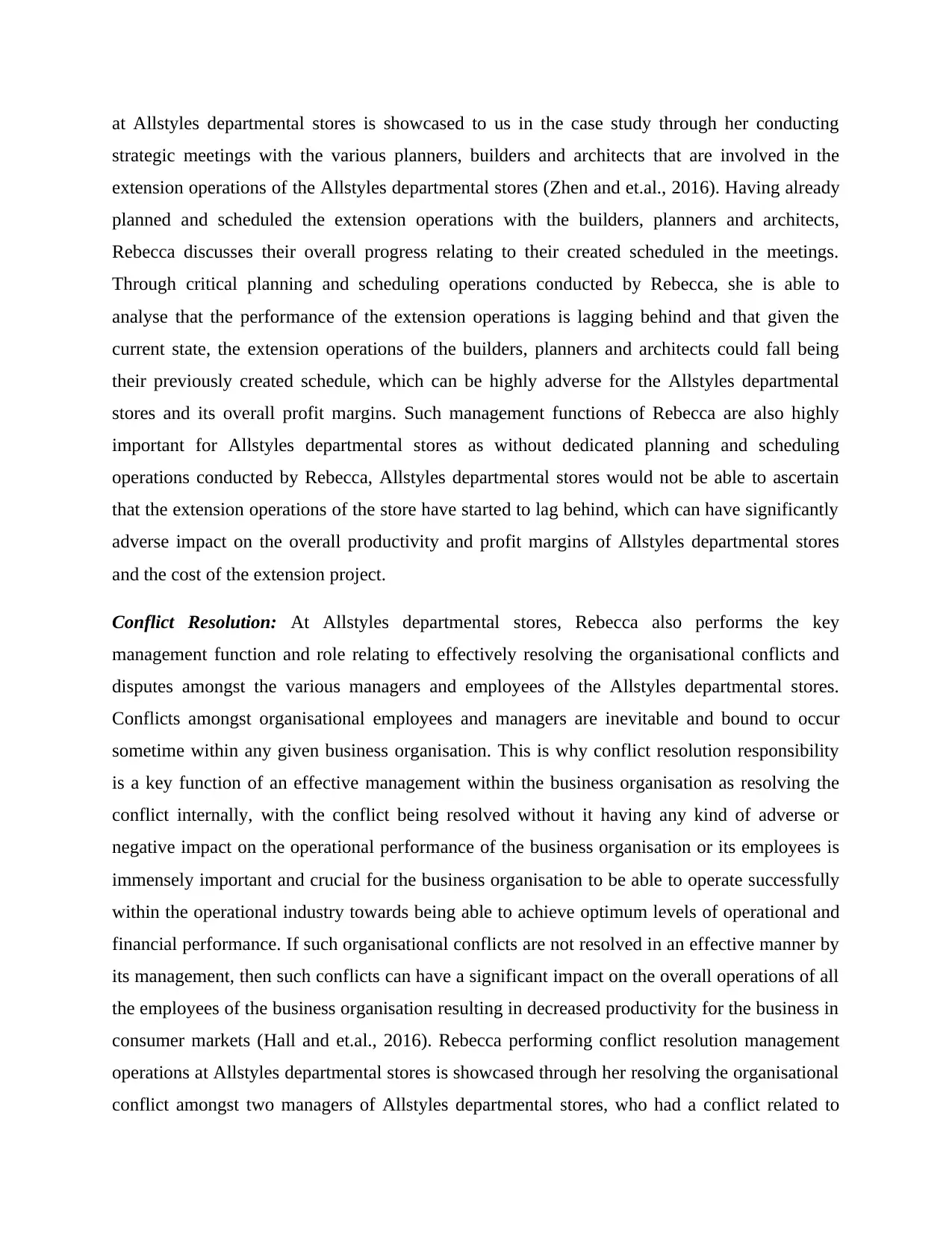
at Allstyles departmental stores is showcased to us in the case study through her conducting
strategic meetings with the various planners, builders and architects that are involved in the
extension operations of the Allstyles departmental stores (Zhen and et.al., 2016). Having already
planned and scheduled the extension operations with the builders, planners and architects,
Rebecca discusses their overall progress relating to their created scheduled in the meetings.
Through critical planning and scheduling operations conducted by Rebecca, she is able to
analyse that the performance of the extension operations is lagging behind and that given the
current state, the extension operations of the builders, planners and architects could fall being
their previously created schedule, which can be highly adverse for the Allstyles departmental
stores and its overall profit margins. Such management functions of Rebecca are also highly
important for Allstyles departmental stores as without dedicated planning and scheduling
operations conducted by Rebecca, Allstyles departmental stores would not be able to ascertain
that the extension operations of the store have started to lag behind, which can have significantly
adverse impact on the overall productivity and profit margins of Allstyles departmental stores
and the cost of the extension project.
Conflict Resolution: At Allstyles departmental stores, Rebecca also performs the key
management function and role relating to effectively resolving the organisational conflicts and
disputes amongst the various managers and employees of the Allstyles departmental stores.
Conflicts amongst organisational employees and managers are inevitable and bound to occur
sometime within any given business organisation. This is why conflict resolution responsibility
is a key function of an effective management within the business organisation as resolving the
conflict internally, with the conflict being resolved without it having any kind of adverse or
negative impact on the operational performance of the business organisation or its employees is
immensely important and crucial for the business organisation to be able to operate successfully
within the operational industry towards being able to achieve optimum levels of operational and
financial performance. If such organisational conflicts are not resolved in an effective manner by
its management, then such conflicts can have a significant impact on the overall operations of all
the employees of the business organisation resulting in decreased productivity for the business in
consumer markets (Hall and et.al., 2016). Rebecca performing conflict resolution management
operations at Allstyles departmental stores is showcased through her resolving the organisational
conflict amongst two managers of Allstyles departmental stores, who had a conflict related to
strategic meetings with the various planners, builders and architects that are involved in the
extension operations of the Allstyles departmental stores (Zhen and et.al., 2016). Having already
planned and scheduled the extension operations with the builders, planners and architects,
Rebecca discusses their overall progress relating to their created scheduled in the meetings.
Through critical planning and scheduling operations conducted by Rebecca, she is able to
analyse that the performance of the extension operations is lagging behind and that given the
current state, the extension operations of the builders, planners and architects could fall being
their previously created schedule, which can be highly adverse for the Allstyles departmental
stores and its overall profit margins. Such management functions of Rebecca are also highly
important for Allstyles departmental stores as without dedicated planning and scheduling
operations conducted by Rebecca, Allstyles departmental stores would not be able to ascertain
that the extension operations of the store have started to lag behind, which can have significantly
adverse impact on the overall productivity and profit margins of Allstyles departmental stores
and the cost of the extension project.
Conflict Resolution: At Allstyles departmental stores, Rebecca also performs the key
management function and role relating to effectively resolving the organisational conflicts and
disputes amongst the various managers and employees of the Allstyles departmental stores.
Conflicts amongst organisational employees and managers are inevitable and bound to occur
sometime within any given business organisation. This is why conflict resolution responsibility
is a key function of an effective management within the business organisation as resolving the
conflict internally, with the conflict being resolved without it having any kind of adverse or
negative impact on the operational performance of the business organisation or its employees is
immensely important and crucial for the business organisation to be able to operate successfully
within the operational industry towards being able to achieve optimum levels of operational and
financial performance. If such organisational conflicts are not resolved in an effective manner by
its management, then such conflicts can have a significant impact on the overall operations of all
the employees of the business organisation resulting in decreased productivity for the business in
consumer markets (Hall and et.al., 2016). Rebecca performing conflict resolution management
operations at Allstyles departmental stores is showcased through her resolving the organisational
conflict amongst two managers of Allstyles departmental stores, who had a conflict related to
Paraphrase This Document
Need a fresh take? Get an instant paraphrase of this document with our AI Paraphraser
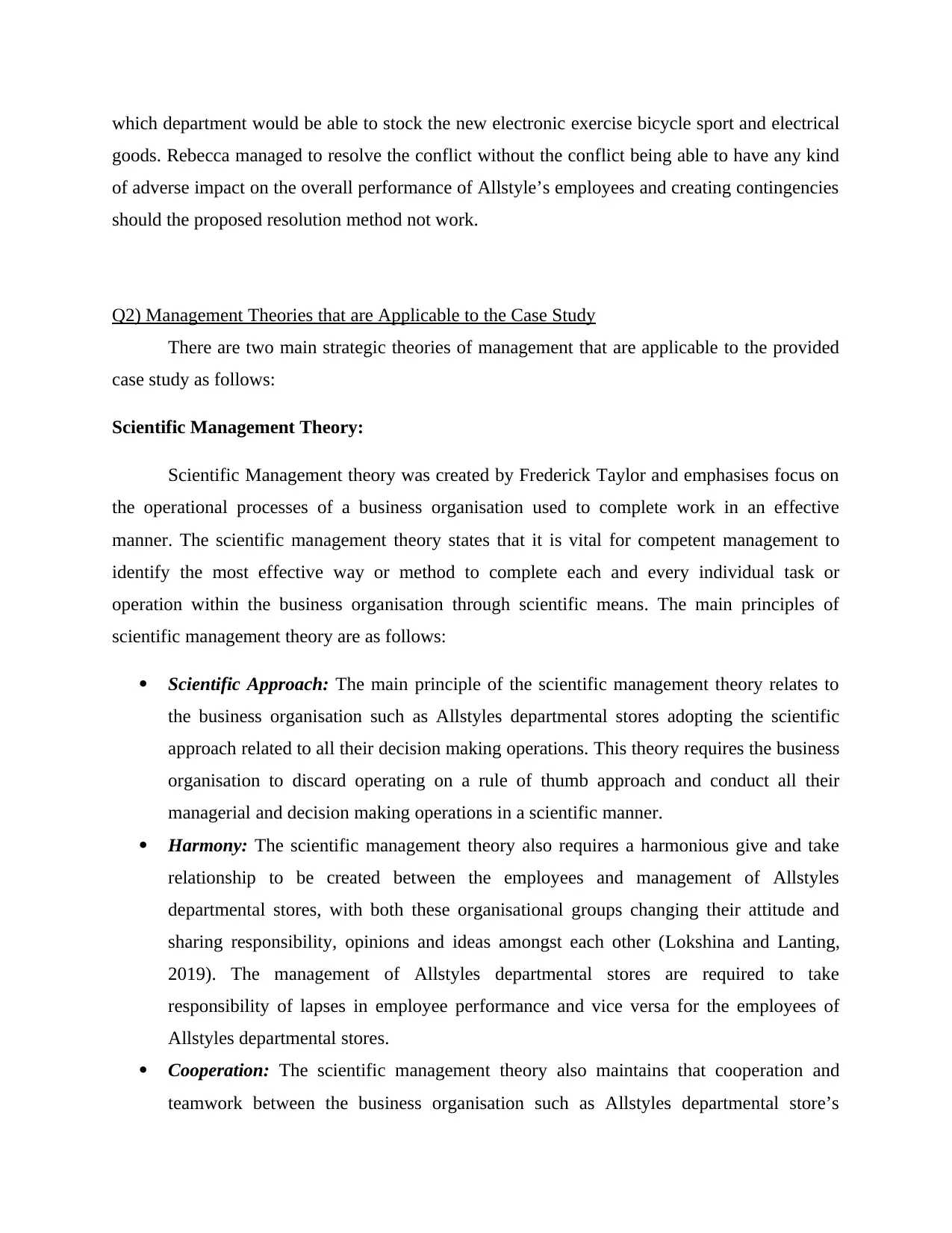
which department would be able to stock the new electronic exercise bicycle sport and electrical
goods. Rebecca managed to resolve the conflict without the conflict being able to have any kind
of adverse impact on the overall performance of Allstyle’s employees and creating contingencies
should the proposed resolution method not work.
Q2) Management Theories that are Applicable to the Case Study
There are two main strategic theories of management that are applicable to the provided
case study as follows:
Scientific Management Theory:
Scientific Management theory was created by Frederick Taylor and emphasises focus on
the operational processes of a business organisation used to complete work in an effective
manner. The scientific management theory states that it is vital for competent management to
identify the most effective way or method to complete each and every individual task or
operation within the business organisation through scientific means. The main principles of
scientific management theory are as follows:
Scientific Approach: The main principle of the scientific management theory relates to
the business organisation such as Allstyles departmental stores adopting the scientific
approach related to all their decision making operations. This theory requires the business
organisation to discard operating on a rule of thumb approach and conduct all their
managerial and decision making operations in a scientific manner.
Harmony: The scientific management theory also requires a harmonious give and take
relationship to be created between the employees and management of Allstyles
departmental stores, with both these organisational groups changing their attitude and
sharing responsibility, opinions and ideas amongst each other (Lokshina and Lanting,
2019). The management of Allstyles departmental stores are required to take
responsibility of lapses in employee performance and vice versa for the employees of
Allstyles departmental stores.
Cooperation: The scientific management theory also maintains that cooperation and
teamwork between the business organisation such as Allstyles departmental store’s
goods. Rebecca managed to resolve the conflict without the conflict being able to have any kind
of adverse impact on the overall performance of Allstyle’s employees and creating contingencies
should the proposed resolution method not work.
Q2) Management Theories that are Applicable to the Case Study
There are two main strategic theories of management that are applicable to the provided
case study as follows:
Scientific Management Theory:
Scientific Management theory was created by Frederick Taylor and emphasises focus on
the operational processes of a business organisation used to complete work in an effective
manner. The scientific management theory states that it is vital for competent management to
identify the most effective way or method to complete each and every individual task or
operation within the business organisation through scientific means. The main principles of
scientific management theory are as follows:
Scientific Approach: The main principle of the scientific management theory relates to
the business organisation such as Allstyles departmental stores adopting the scientific
approach related to all their decision making operations. This theory requires the business
organisation to discard operating on a rule of thumb approach and conduct all their
managerial and decision making operations in a scientific manner.
Harmony: The scientific management theory also requires a harmonious give and take
relationship to be created between the employees and management of Allstyles
departmental stores, with both these organisational groups changing their attitude and
sharing responsibility, opinions and ideas amongst each other (Lokshina and Lanting,
2019). The management of Allstyles departmental stores are required to take
responsibility of lapses in employee performance and vice versa for the employees of
Allstyles departmental stores.
Cooperation: The scientific management theory also maintains that cooperation and
teamwork between the business organisation such as Allstyles departmental store’s
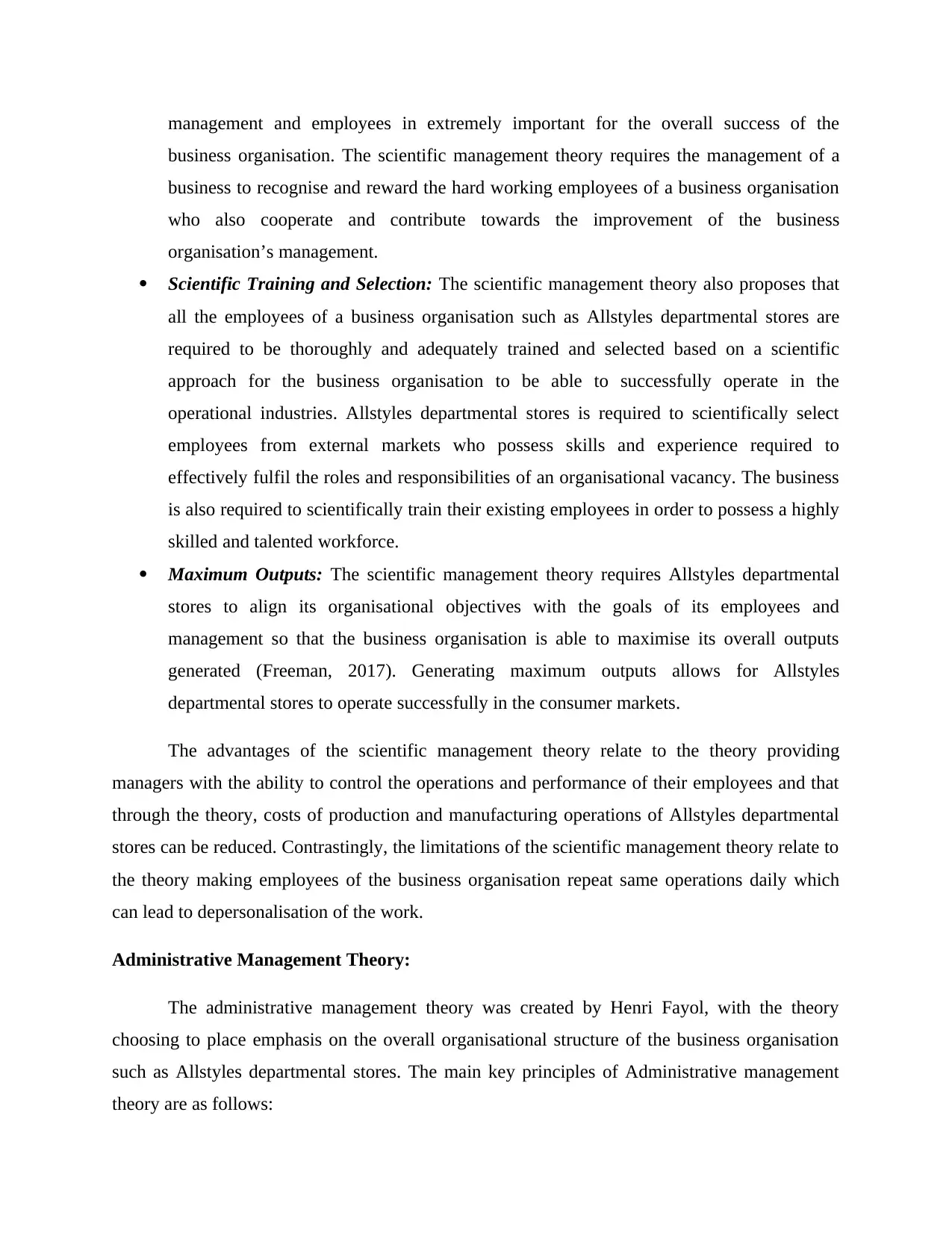
management and employees in extremely important for the overall success of the
business organisation. The scientific management theory requires the management of a
business to recognise and reward the hard working employees of a business organisation
who also cooperate and contribute towards the improvement of the business
organisation’s management.
Scientific Training and Selection: The scientific management theory also proposes that
all the employees of a business organisation such as Allstyles departmental stores are
required to be thoroughly and adequately trained and selected based on a scientific
approach for the business organisation to be able to successfully operate in the
operational industries. Allstyles departmental stores is required to scientifically select
employees from external markets who possess skills and experience required to
effectively fulfil the roles and responsibilities of an organisational vacancy. The business
is also required to scientifically train their existing employees in order to possess a highly
skilled and talented workforce.
Maximum Outputs: The scientific management theory requires Allstyles departmental
stores to align its organisational objectives with the goals of its employees and
management so that the business organisation is able to maximise its overall outputs
generated (Freeman, 2017). Generating maximum outputs allows for Allstyles
departmental stores to operate successfully in the consumer markets.
The advantages of the scientific management theory relate to the theory providing
managers with the ability to control the operations and performance of their employees and that
through the theory, costs of production and manufacturing operations of Allstyles departmental
stores can be reduced. Contrastingly, the limitations of the scientific management theory relate to
the theory making employees of the business organisation repeat same operations daily which
can lead to depersonalisation of the work.
Administrative Management Theory:
The administrative management theory was created by Henri Fayol, with the theory
choosing to place emphasis on the overall organisational structure of the business organisation
such as Allstyles departmental stores. The main key principles of Administrative management
theory are as follows:
business organisation. The scientific management theory requires the management of a
business to recognise and reward the hard working employees of a business organisation
who also cooperate and contribute towards the improvement of the business
organisation’s management.
Scientific Training and Selection: The scientific management theory also proposes that
all the employees of a business organisation such as Allstyles departmental stores are
required to be thoroughly and adequately trained and selected based on a scientific
approach for the business organisation to be able to successfully operate in the
operational industries. Allstyles departmental stores is required to scientifically select
employees from external markets who possess skills and experience required to
effectively fulfil the roles and responsibilities of an organisational vacancy. The business
is also required to scientifically train their existing employees in order to possess a highly
skilled and talented workforce.
Maximum Outputs: The scientific management theory requires Allstyles departmental
stores to align its organisational objectives with the goals of its employees and
management so that the business organisation is able to maximise its overall outputs
generated (Freeman, 2017). Generating maximum outputs allows for Allstyles
departmental stores to operate successfully in the consumer markets.
The advantages of the scientific management theory relate to the theory providing
managers with the ability to control the operations and performance of their employees and that
through the theory, costs of production and manufacturing operations of Allstyles departmental
stores can be reduced. Contrastingly, the limitations of the scientific management theory relate to
the theory making employees of the business organisation repeat same operations daily which
can lead to depersonalisation of the work.
Administrative Management Theory:
The administrative management theory was created by Henri Fayol, with the theory
choosing to place emphasis on the overall organisational structure of the business organisation
such as Allstyles departmental stores. The main key principles of Administrative management
theory are as follows:
⊘ This is a preview!⊘
Do you want full access?
Subscribe today to unlock all pages.

Trusted by 1+ million students worldwide
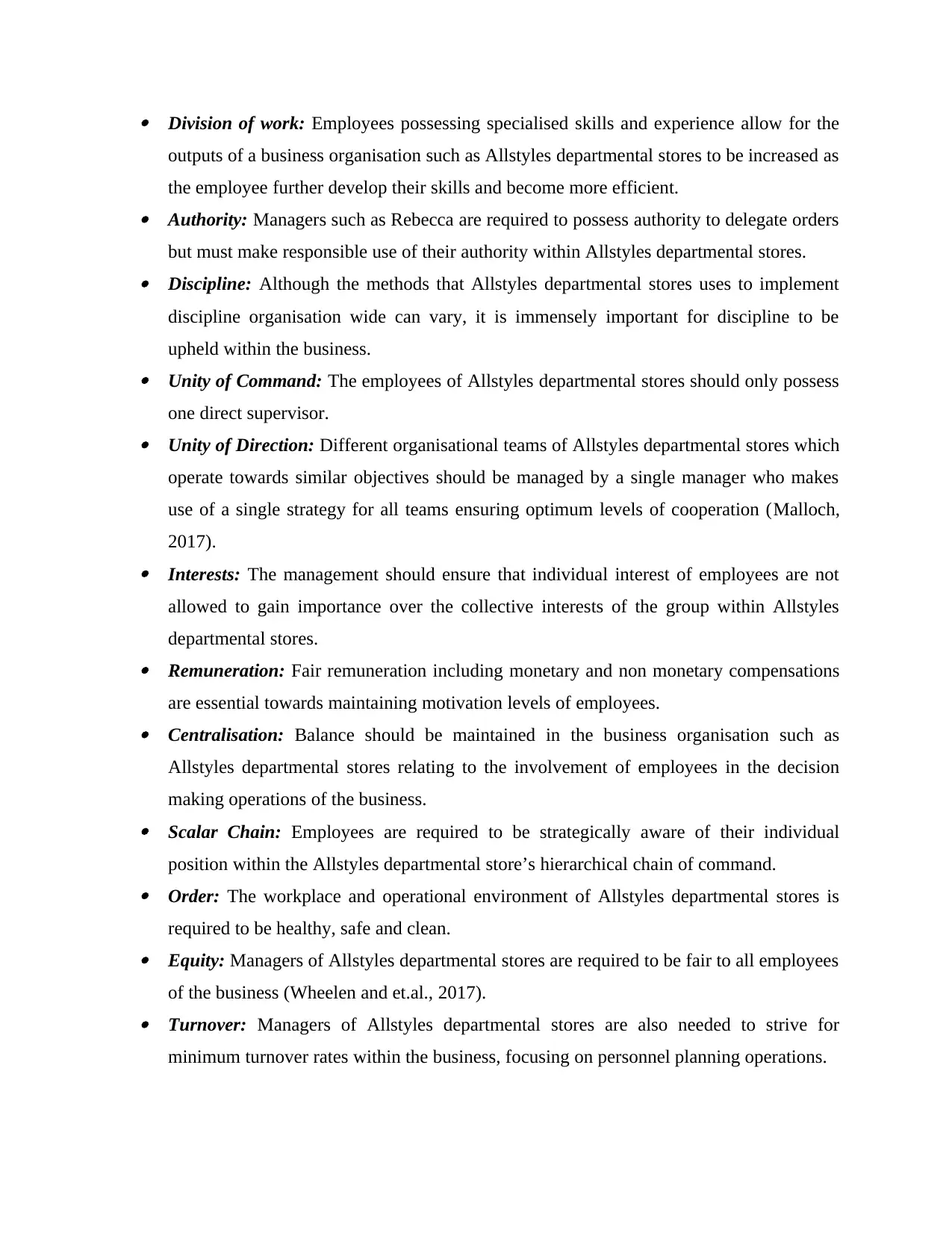
Division of work: Employees possessing specialised skills and experience allow for the
outputs of a business organisation such as Allstyles departmental stores to be increased as
the employee further develop their skills and become more efficient. Authority: Managers such as Rebecca are required to possess authority to delegate orders
but must make responsible use of their authority within Allstyles departmental stores. Discipline: Although the methods that Allstyles departmental stores uses to implement
discipline organisation wide can vary, it is immensely important for discipline to be
upheld within the business. Unity of Command: The employees of Allstyles departmental stores should only possess
one direct supervisor. Unity of Direction: Different organisational teams of Allstyles departmental stores which
operate towards similar objectives should be managed by a single manager who makes
use of a single strategy for all teams ensuring optimum levels of cooperation (Malloch,
2017). Interests: The management should ensure that individual interest of employees are not
allowed to gain importance over the collective interests of the group within Allstyles
departmental stores. Remuneration: Fair remuneration including monetary and non monetary compensations
are essential towards maintaining motivation levels of employees. Centralisation: Balance should be maintained in the business organisation such as
Allstyles departmental stores relating to the involvement of employees in the decision
making operations of the business. Scalar Chain: Employees are required to be strategically aware of their individual
position within the Allstyles departmental store’s hierarchical chain of command. Order: The workplace and operational environment of Allstyles departmental stores is
required to be healthy, safe and clean. Equity: Managers of Allstyles departmental stores are required to be fair to all employees
of the business (Wheelen and et.al., 2017). Turnover: Managers of Allstyles departmental stores are also needed to strive for
minimum turnover rates within the business, focusing on personnel planning operations.
outputs of a business organisation such as Allstyles departmental stores to be increased as
the employee further develop their skills and become more efficient. Authority: Managers such as Rebecca are required to possess authority to delegate orders
but must make responsible use of their authority within Allstyles departmental stores. Discipline: Although the methods that Allstyles departmental stores uses to implement
discipline organisation wide can vary, it is immensely important for discipline to be
upheld within the business. Unity of Command: The employees of Allstyles departmental stores should only possess
one direct supervisor. Unity of Direction: Different organisational teams of Allstyles departmental stores which
operate towards similar objectives should be managed by a single manager who makes
use of a single strategy for all teams ensuring optimum levels of cooperation (Malloch,
2017). Interests: The management should ensure that individual interest of employees are not
allowed to gain importance over the collective interests of the group within Allstyles
departmental stores. Remuneration: Fair remuneration including monetary and non monetary compensations
are essential towards maintaining motivation levels of employees. Centralisation: Balance should be maintained in the business organisation such as
Allstyles departmental stores relating to the involvement of employees in the decision
making operations of the business. Scalar Chain: Employees are required to be strategically aware of their individual
position within the Allstyles departmental store’s hierarchical chain of command. Order: The workplace and operational environment of Allstyles departmental stores is
required to be healthy, safe and clean. Equity: Managers of Allstyles departmental stores are required to be fair to all employees
of the business (Wheelen and et.al., 2017). Turnover: Managers of Allstyles departmental stores are also needed to strive for
minimum turnover rates within the business, focusing on personnel planning operations.
Paraphrase This Document
Need a fresh take? Get an instant paraphrase of this document with our AI Paraphraser
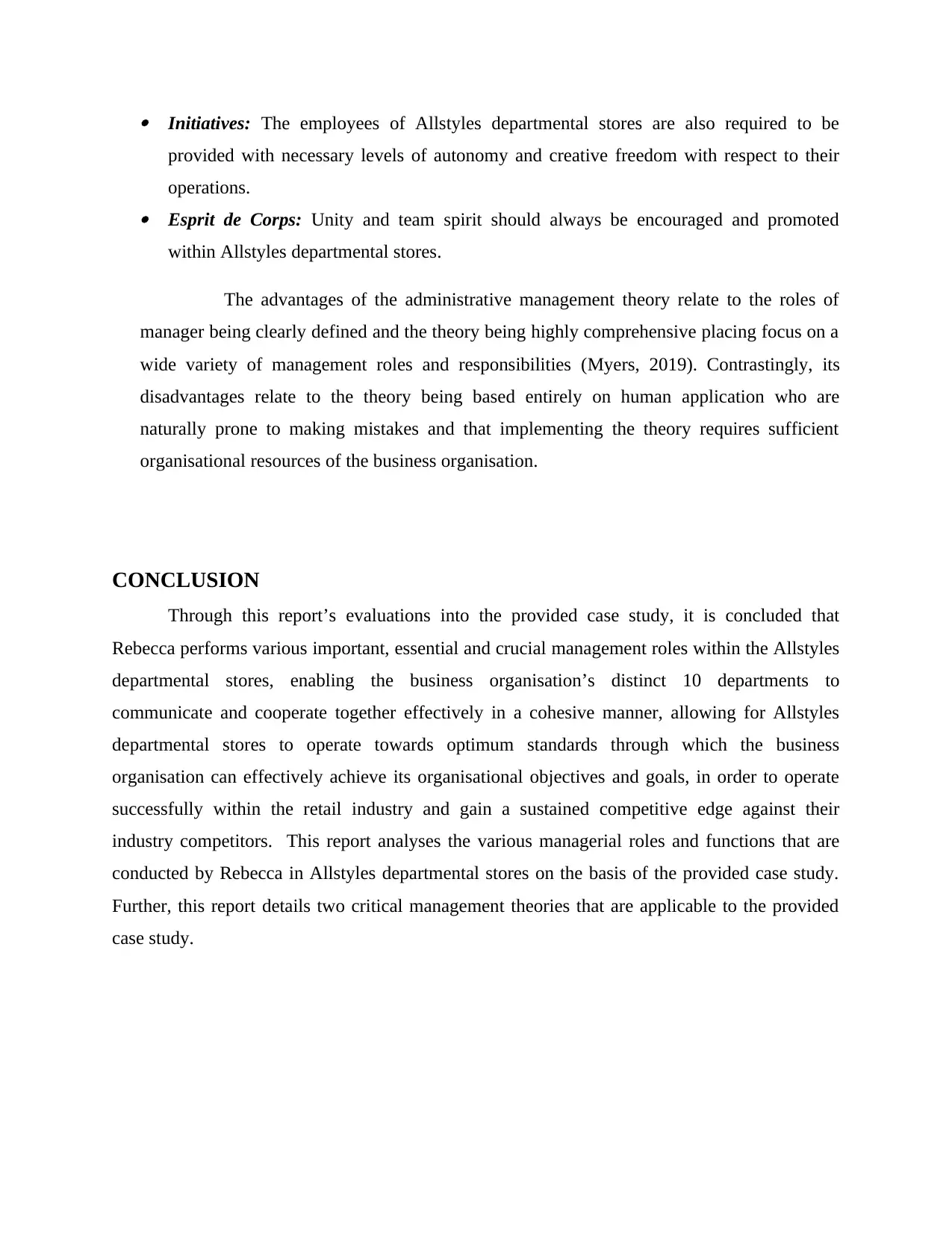
Initiatives: The employees of Allstyles departmental stores are also required to be
provided with necessary levels of autonomy and creative freedom with respect to their
operations. Esprit de Corps: Unity and team spirit should always be encouraged and promoted
within Allstyles departmental stores.
The advantages of the administrative management theory relate to the roles of
manager being clearly defined and the theory being highly comprehensive placing focus on a
wide variety of management roles and responsibilities (Myers, 2019). Contrastingly, its
disadvantages relate to the theory being based entirely on human application who are
naturally prone to making mistakes and that implementing the theory requires sufficient
organisational resources of the business organisation.
CONCLUSION
Through this report’s evaluations into the provided case study, it is concluded that
Rebecca performs various important, essential and crucial management roles within the Allstyles
departmental stores, enabling the business organisation’s distinct 10 departments to
communicate and cooperate together effectively in a cohesive manner, allowing for Allstyles
departmental stores to operate towards optimum standards through which the business
organisation can effectively achieve its organisational objectives and goals, in order to operate
successfully within the retail industry and gain a sustained competitive edge against their
industry competitors. This report analyses the various managerial roles and functions that are
conducted by Rebecca in Allstyles departmental stores on the basis of the provided case study.
Further, this report details two critical management theories that are applicable to the provided
case study.
provided with necessary levels of autonomy and creative freedom with respect to their
operations. Esprit de Corps: Unity and team spirit should always be encouraged and promoted
within Allstyles departmental stores.
The advantages of the administrative management theory relate to the roles of
manager being clearly defined and the theory being highly comprehensive placing focus on a
wide variety of management roles and responsibilities (Myers, 2019). Contrastingly, its
disadvantages relate to the theory being based entirely on human application who are
naturally prone to making mistakes and that implementing the theory requires sufficient
organisational resources of the business organisation.
CONCLUSION
Through this report’s evaluations into the provided case study, it is concluded that
Rebecca performs various important, essential and crucial management roles within the Allstyles
departmental stores, enabling the business organisation’s distinct 10 departments to
communicate and cooperate together effectively in a cohesive manner, allowing for Allstyles
departmental stores to operate towards optimum standards through which the business
organisation can effectively achieve its organisational objectives and goals, in order to operate
successfully within the retail industry and gain a sustained competitive edge against their
industry competitors. This report analyses the various managerial roles and functions that are
conducted by Rebecca in Allstyles departmental stores on the basis of the provided case study.
Further, this report details two critical management theories that are applicable to the provided
case study.
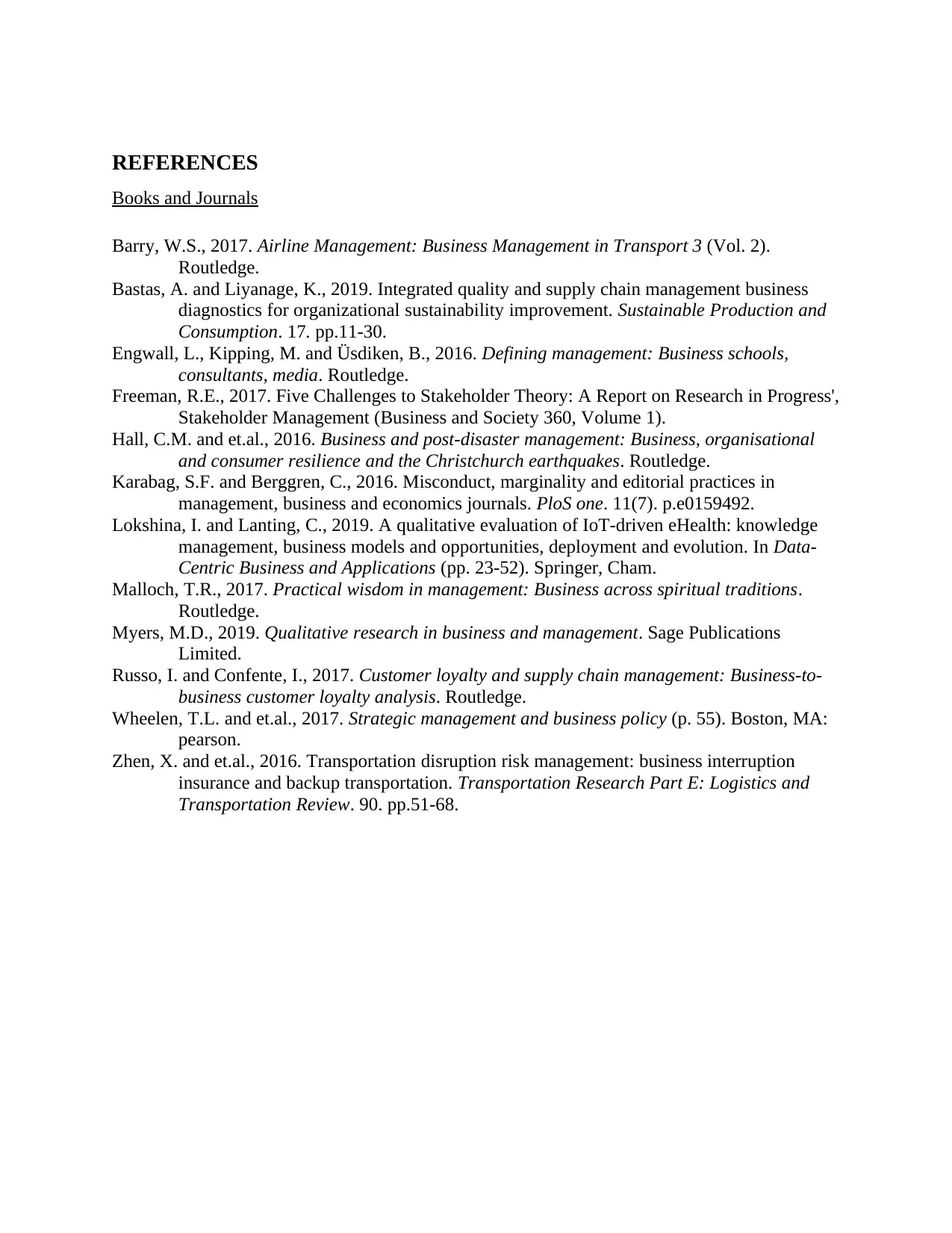
REFERENCES
Books and Journals
Barry, W.S., 2017. Airline Management: Business Management in Transport 3 (Vol. 2).
Routledge.
Bastas, A. and Liyanage, K., 2019. Integrated quality and supply chain management business
diagnostics for organizational sustainability improvement. Sustainable Production and
Consumption. 17. pp.11-30.
Engwall, L., Kipping, M. and Üsdiken, B., 2016. Defining management: Business schools,
consultants, media. Routledge.
Freeman, R.E., 2017. Five Challenges to Stakeholder Theory: A Report on Research in Progress',
Stakeholder Management (Business and Society 360, Volume 1).
Hall, C.M. and et.al., 2016. Business and post-disaster management: Business, organisational
and consumer resilience and the Christchurch earthquakes. Routledge.
Karabag, S.F. and Berggren, C., 2016. Misconduct, marginality and editorial practices in
management, business and economics journals. PloS one. 11(7). p.e0159492.
Lokshina, I. and Lanting, C., 2019. A qualitative evaluation of IoT-driven eHealth: knowledge
management, business models and opportunities, deployment and evolution. In Data-
Centric Business and Applications (pp. 23-52). Springer, Cham.
Malloch, T.R., 2017. Practical wisdom in management: Business across spiritual traditions.
Routledge.
Myers, M.D., 2019. Qualitative research in business and management. Sage Publications
Limited.
Russo, I. and Confente, I., 2017. Customer loyalty and supply chain management: Business-to-
business customer loyalty analysis. Routledge.
Wheelen, T.L. and et.al., 2017. Strategic management and business policy (p. 55). Boston, MA:
pearson.
Zhen, X. and et.al., 2016. Transportation disruption risk management: business interruption
insurance and backup transportation. Transportation Research Part E: Logistics and
Transportation Review. 90. pp.51-68.
Books and Journals
Barry, W.S., 2017. Airline Management: Business Management in Transport 3 (Vol. 2).
Routledge.
Bastas, A. and Liyanage, K., 2019. Integrated quality and supply chain management business
diagnostics for organizational sustainability improvement. Sustainable Production and
Consumption. 17. pp.11-30.
Engwall, L., Kipping, M. and Üsdiken, B., 2016. Defining management: Business schools,
consultants, media. Routledge.
Freeman, R.E., 2017. Five Challenges to Stakeholder Theory: A Report on Research in Progress',
Stakeholder Management (Business and Society 360, Volume 1).
Hall, C.M. and et.al., 2016. Business and post-disaster management: Business, organisational
and consumer resilience and the Christchurch earthquakes. Routledge.
Karabag, S.F. and Berggren, C., 2016. Misconduct, marginality and editorial practices in
management, business and economics journals. PloS one. 11(7). p.e0159492.
Lokshina, I. and Lanting, C., 2019. A qualitative evaluation of IoT-driven eHealth: knowledge
management, business models and opportunities, deployment and evolution. In Data-
Centric Business and Applications (pp. 23-52). Springer, Cham.
Malloch, T.R., 2017. Practical wisdom in management: Business across spiritual traditions.
Routledge.
Myers, M.D., 2019. Qualitative research in business and management. Sage Publications
Limited.
Russo, I. and Confente, I., 2017. Customer loyalty and supply chain management: Business-to-
business customer loyalty analysis. Routledge.
Wheelen, T.L. and et.al., 2017. Strategic management and business policy (p. 55). Boston, MA:
pearson.
Zhen, X. and et.al., 2016. Transportation disruption risk management: business interruption
insurance and backup transportation. Transportation Research Part E: Logistics and
Transportation Review. 90. pp.51-68.
⊘ This is a preview!⊘
Do you want full access?
Subscribe today to unlock all pages.

Trusted by 1+ million students worldwide
1 out of 12
Related Documents
Your All-in-One AI-Powered Toolkit for Academic Success.
+13062052269
info@desklib.com
Available 24*7 on WhatsApp / Email
![[object Object]](/_next/static/media/star-bottom.7253800d.svg)
Unlock your academic potential
Copyright © 2020–2026 A2Z Services. All Rights Reserved. Developed and managed by ZUCOL.




